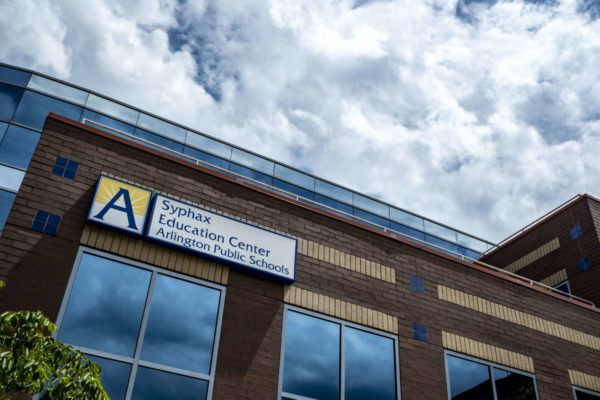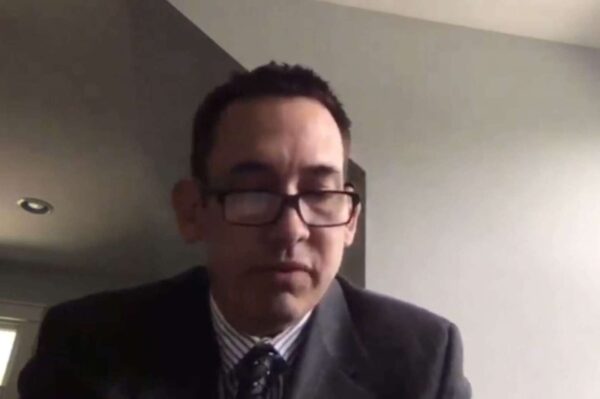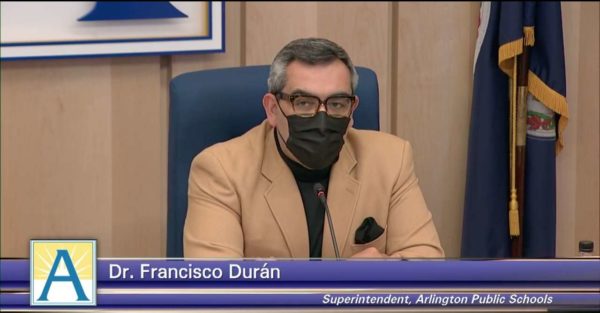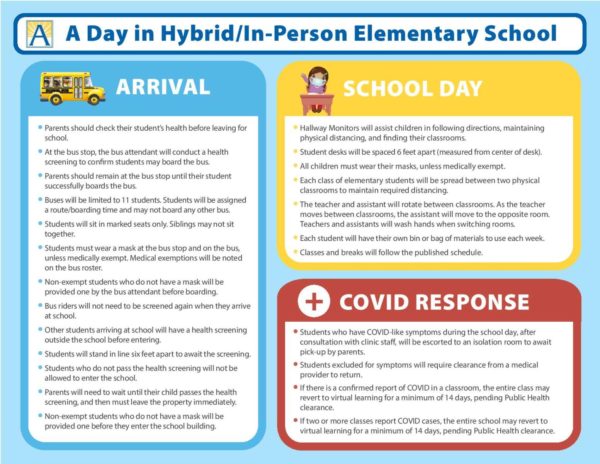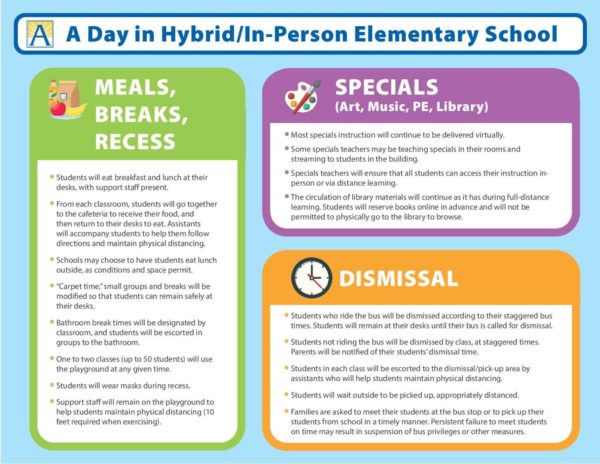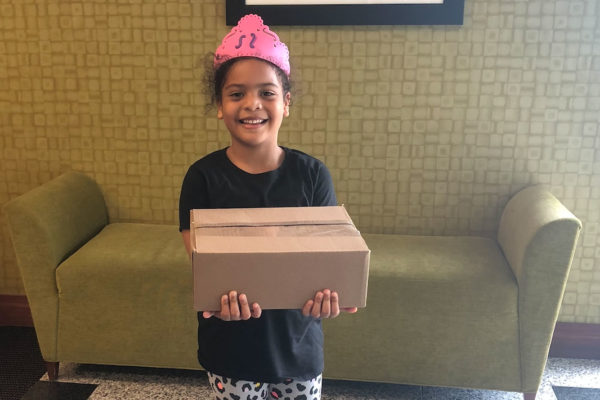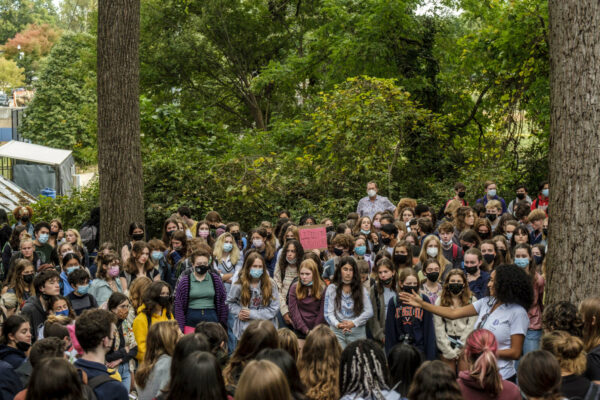
A petition calling on Arlington Public Schools to ramp up education on sexual misconduct and healthy relationships has netted more than 31,000 signatures.
The petition targets Yorktown High School, where in October a homecoming football game was marred by “unacceptable behavior” by a group of students. Several Yorktown students reportedly harassed fellow students with sexual language, and one student told police she was inappropriately touched.
These events in part sparked walkouts at YHS and other high schools in APS across the county a few weeks later.
“To put in plainly, Yorktown has a problem with sexual misconduct,” said the petition authors, who are members of the Teen Network Board, a county- and APS-appointed teen advocacy group. “We are two of many concerned students who want to change the way the system works to handle issues such as sexual harassment and assault in schools.”
The student authors propose introducing two prevention and awareness programs at Yorktown, and possibly throughout APS. They call on YHS to “hold students accountable for their actions in schools” and to make reporting sexual assault and harassment to administrators easier.
As of Tuesday morning, more than 31,600 people had signed the petition. In an update to the petition on Friday, the authors said exceeding 20,000 signatures was “absolutely amazing,” as their initial goal was around 1,000-2,000 signatures.
In the update, the authors said they were meeting with Yorktown administrators Monday (yesterday) to discuss implementing their proposals at YHS. They said they reached out to Superintendent Francisco Durán and the School Board to discuss making the changes at a county level.
“Arlington Public Schools is aware of the petition, and we fully support and stand with our students against sexual harassment and assault in our schools and community,” Durán said in a statement sent to ARLnow. “We are also open and committed to the exploration of additional ways we can support students at Yorktown High School, and across the division.”
Together, APS and Yorktown staff and student members of the Teen Network Board will review current practices and consider their recommendations, as well as any additional steps needed to ensure every student feels safe, accepted and respected at school, he said.
Specifically, the petition recommends introducing Coaching Boys into Men and safeBAE. The first is a prevention-based education program for male athletes in which coaches educate players on how to have healthy relationships and be leaders in the community. The second would “spread awareness” about sexual misconduct and healthy relationships to the general student body.
“A lot of sexual misconduct in schools is caused by ignorance; often students don’t know what they’re doing is wrong. Education is key in preventing assault and harassment,” the petition said. “We want to make our community a safe and positive place for all students.”
Currently, Yorktown partners with several outside educational and advocacy organizations, such as Doorways and Project PEACE, that target intimate partner violence, according to Durán. The school holds assemblies to educate and support students and the Students Against Sexual Assault Club works to de-stigmatize and educate their peers about sexual assault.
He affirmed that Yorktown follows APS policy and procedures for responding to reported incidents of harassment or assault. He said all complaints are followed up on “with appropriate actions to prevent the behavior from happening again and provide the needed supports to students.”
“We encourage students to report incidents to a teacher, counselor, administrator or parent,” he said. “If a Yorktown student does not feel comfortable reporting in person, we encourage them to use the anonymous Student Safety Reporting form found on the Yorktown homepage.”
(Updated at 2:50 p.m.) A multi-year legal battle between a family and Arlington Public Schools over the appropriateness of their child’s special education support ended this summer with a decision in APS’s favor, handed down by federal court.
While the avenues for dispute resolution dead-end there for the family, the decision provides an insight into how fraught the special education system can be. What is supposed to be a collaborative effort among schools and parents can turn into a grueling legal process if the parents and the school system disagree over aspects of the child’s disability or which setting best meets their needs.
In this case, the parents sued APS, requesting it pay for tuition at a private day school that — according to them — would be better for their child than Williamsburg Middle School. The federal court decision said APS did not have to pay the cost of tuition.
The court also overturned a lower ruling by a state officer who said the school system should reimburse the parents for a private evaluation they obtained. A psychologist found their child exhibited disabilities that APS did not find in their evaluation.
This case reveals how some decisions favor schools partially because parents make procedural missteps before they realize that every step of the process could become evidence in a hearing later on, special education lawyer Juliet Hiznay tells ARLnow.
She said both the hearing officer and the federal decision were well-reasoned, and that the parents made a couple of common errors.
“A lot of parents get caught up in sort of what I call traps for the unwary: not preserving their claims, not communicating them during meetings, not getting them on the record,” she said.
That the case reached federal court is also exceedingly rare, because the special education legal system is set up to have these issues resolved in meetings and mediation sessions, she said. The parents sued after an administrative process with an independent hearing officer did not go in their favor.
“There is a risk associated with doing this. There’s an emotional toll, and practical price to pay: School districts don’t like being sued, so the relationship gets destroyed when you sue a school division,” she said. “And many parents are afraid, and some of them have more than one child, and they don’t want to risk any kind of retaliation by the school district.”
One family’s experience
The boy at the center of the lawsuit is currently attending a private school in Sterling, Virginia, according to federal court documents. The home school is Nottingham Elementary School, which he attended from kindergarten through fourth grade.
While at Nottingham, his parents and school officials noticed he struggled academically and socially. During an assessment in the first grade, he “presented with difficulty in a number of different areas” including reading, writing and math, attention and organization and making friends, according to a lawsuit filed on behalf of the parents.
He was given an Individualized Education Plan (IEP), a document outlining the services the school will provide, under the category of “specific learning disability.” But by fourth grade, he “still continued to struggle greatly,” per the lawsuit.
According to Virginia Department of Education data, APS has been providing services to steadily more children with presumed or diagnosed specific learning disabilities in the last four years.
Gov. Ralph Northam and Virginia Secretary of Education Atif Qarni visited Barcroft Elementary School today (Monday) to get a glimpse of summer learning opportunities in Arlington Public Schools.
The visit is part of a tour of Virginia schools offering summer learning to select students in most need of academic support after a year of virtual learning. In Arlington, more than 4,600 students are enrolled in summer learning, of whom nearly 3,500 are attending in person.
“It’s been amazing… seeing kids happy to be in the classroom, seeing teachers and staff so enthusiastic,” Northam said. “Our future is in good hands.”
At Barcroft (625 S. Wakefield Street), 100 students are enrolled in summer learning, which is focused on strengthening math and reading skills, said Catherine Ashby, a spokeswoman for APS. The school system has an additional 480 elementary students participating in a new program, available for those who initially qualified for summer school but were deemed unable to participate.
Initially, APS had expanded eligibility requirements for summer school to reach more students. Citing teacher shortages, however, it later contracted eligibility. This summer, 850 teachers and staff are providing instruction to certain students with disabilities and who are learning English, as well as some regular-education students with failing grades or who need a core class to graduate high school.
Inside the classroom, students and teachers wore masks. The governor is preparing to release new mask guidelines this week in light of rising cases of the coronavirus. The new guidance will replace the executive order governing mask wearing, which is set to expire on Sunday (July 25).
As cases climb and the more contagious Delta variant spreads, and with most children unable to receive the vaccine, the American College of Pediatrics — of which Northam is a member — recently recommended that all kids should wear masks while indoors. Northam said the new state rules will likely be aligned with recommendations from the Centers for Disease Control and Prevention.
“We will definitely have guidelines before the weekend,” he said.
Virginia is reporting about 250 to 300 new cases per day, due in part to the rise of the Delta variant. Northam said he encouraged parents to vaccinate their children 12 years old and older with the Pfizer shot. About 35% of eligible children in the Commonwealth have received their first dose, he said.
Still, state officials said they want children attending school in person.
“We have had a lot of unfinished learning,” Qarni said. “We do know the best place to learn is in person.”
APS officials have pledged that the school system will be fully in-person this fall. For the first four weeks of school, APS will be focused on social-emotional learning and academic assessments, Ashby said, as it tries to make up for lost learning last school year.
At Barcroft, Northam also saw a new literacy program at work.
Principal Judy Apostolico-Buck tells ARLnow the school formally implemented the program — which focuses on teaching the mechanics of reading — last year. This approach, called structured literacy, will be implemented across elementary schools in Arlington this fall to improve reading proficiency rates.
“We need something that guarantees literacy proficiency for all students,” she said. “It’s been a big shift, but the research unequivocally shows that this is what we need to do.”
(Updated 12:20 a.m.) Before the coronavirus, Reade Bush’s son was a talkative child with autism and ADHD who loved school and his friends.
But the pandemic changed the world and in turn changed him. Without a routine and social opportunities, his son created an imaginary world “with 52 friends.” By summertime, he struggled to distinguish his real world from his imaginary one. He began hallucinating.
“On his ninth birthday, he asked me, ‘Daddy, can I die for my birthday?'” he recounted to some members of the U.S. House of Representatives’ Labor and Education Committee last Thursday. Encouraged by another APS parent, who had connections on Capitol Hill, Bush told members of the Early Childhood, Elementary and Secondary Education Subcommittee about the ways COVID-19 has impacted students with disabilities.
Public school systems are required by law to provide to students with disabilities the specialized instruction and therapeutic services they need to learn alongside their non-disabled peers where possible. Using his family’s story, Bush told the committee that virtual instruction has made it almost impossible to meet that charge.
Arlington Public Schools, which shut down in March 2020, started the 2020-21 school year with four days of distance learning and one planning day. By November, some students with disabilities could return for in-person learning supports. Since mid-March, students across all grade levels have trickled back for two days of in-person instruction.
This fall, 95% of students will be enrolled for five days a week of in-person instruction, something administrators have repeatedly told families and School Board members that they will deliver. But Bush said his son and and his daughter, who has cerebral palsy, have regressed academically and socially and should have been given in-person instruction sooner.
Over the last year, many parents have recounted stories of their children losing their love of learning. But for Bush, his son lost more than that — he lost sleep, social skills and his grip on reality.
“We feel like we have lost our son,” he tells ARLnow.
Bush and his wife recorded and sent to administrators videos of their son and their daughter struggle to engage with their teachers. He praised his kids’ teachers, therapists and school building-level administrators for “trying to make lemonade from lemons” but Bush had to work nights and his wife had to quit her job to support their children from home.
The parents aimed to get students with disabilities face-to-face with teachers and peers. Bush advocated for this during meetings with teachers and administrators, School Board office hours and Arlington Special Education Advisory Committee meetings.
“We were told, ‘There’s nothing we can do,'” he said.
Meanwhile, his son’s condition worsened, landing him in Children’s National Hospital for four days. After running numerous tests, doctors concluded the child’s autism had worsened due to social isolation.
Doctors prescribed four medications, but said “what he needed most was to return to full-time, in-person learning so that he could begin to solidify his identity with real, in-person teachers and peers,” Bush told the subcommittee.
Bush told ARLnow that three doctors wrote to administrators asking for his son to be placed in an in-person private special-education school. (When local public schools cannot meet children’s needs, it can use state funds to place them in a specialized school).
He said administrators denied his multiple requests in part because his son would only be socializing with students with disabilities. Where possible, another federal statute requires schools to place disabled students with non-disabled peers.
His son instead learned from an iPad in a classroom alone, save for a staff member who helped him, he said.
“In November, we brought in our most vulnerable students with disabilities population to immediately help provide support to access virtual instruction and as soon as we could staff it and tried to provide in-person instruction to the extent possible,” APS spokesman Frank Bellavia told ARLnow this morning. “While some support was provided by special education assistants and Extended day staff, we worked hard to provide training to the staff that supported [these students].”
Depending on local health conditions, Arlington Public Schools students who opt for hybrid instruction could start entering classrooms between the end of October and mid-January.
The staggered return times, along with more details about the school system’s preparations, were announced on Friday during a town hall for parents with Superintendent Francisco Durán and his staff.
Students with disabilities will begin returning on Oct. 29, followed by preschool to fifth-grade students — youngest to oldest — starting in late November and continuing into early December. High-school students taking certain Career and Technical Education courses will also return.
Parents of these students, designated as priority level 2, are being surveyed currently for instruction preferences. All other middle- and high-school students who opt for hybrid instruction comprise Level 3 and are currently expected to return in January.
“We want to be thoughtful of meeting the needs of all of our students who need more support,” Durán said.
During a town hall with teachers earlier last week, Durán told APS staff, including teachers, that balancing their preferences with those of families may mean APS cannot respect the wishes of every family who selects the hybrid option, according to a recording of the meeting, which was provided to ARLnow.
Rather, “with student need as the driver,” those who are falling behind, or have disabilities, those who have difficulty accessing online learning or do not have parents at home will receive the greatest priority in returning to school, he said.
An advocacy group promoting in-person education, Arlington Parents for Education, contends that qualifying for face-to-face education based on need is inconsistent with APS’s mission to provide equal access to public education.
“If APS is going to go down this path of making determinations on behalf of parents which children ‘truly need’ to deserve in-person schooling, then the district should be prepared for and willing to answer questions on the matter,” the group said in a statement. “Based on the volume of questions that were ignored at Friday evening’s town hall, it’s clear Dr. Durán is not being transparent with families, yet again.”
On Friday, parents had a lot of questions, submitted via text, Facebook Live comments and Microsoft Teams chat, ranging from keeping teachers to testing students.
“I recognize how challenging this is for our community, and I know there are many opposing views about how we should proceed,” Durán said.
School officials said parents are concerned with keeping kids with their current teachers, with many wanting to base their survey answers on what their child’s teacher prefers.
“We know there are strong bonds formed, and we will do our very, very best to maintain consistency as best we can with classes and teachers, but we are not going to be able to share what teachers prefer in their survey,” Durán said, asserting that doing so would reveal private health information.
Many others asked about regular COVID-19 testing.
Per the Centers for Disease Control and Prevention, K-12 students should not be regularly tested as a condition for students to return, said Zachary Pope, the school system’s emergency manager.
Rather, students will be pre-screened before boarding the bus or outside the classroom when parents drop them off. Guardians need to stay just in case their child is turned away for exhibiting symptoms, Pope said.
Students who experience symptoms at school will be put in seclusion rooms attended by specialized staff until a guardian can come get them. With the pre-screenings, however, Pope said “we hope we won’t have to have them in those rooms at all.”
Other safety measures include improvements to ventilation and social-distancing on buses. Walk zones have been expanded to keep down bus ridership to 11 students per trip and to mitigate car traffic.
An new tenant in Ballston helps adults in need of a boost to establish foundational computer skills, ultimately expanding their career opportunities.
Called Computer CORE, the educational nonprofit offers courses in Google Suite, email, internet basics, computer security, community college math and similar fields to underserved adults. The classes help workers increase their salary by $10k on average.
The new educational facility will be located in a 3,500 square foot space in the Ballston Exchange complex, across Wilson Blvd from Ballston Quarter mall. The Ballston Business Improvement District coordinated the agreement between Computer CORE and Jamestown, the building’s owner, a press release said.
Overall, Computer CORE has around 150 students, roughly 70 of which will be able to use the new space, according to a spokesperson. In terms of group demographics, around 70% of all enrolled students identify as women and 95% are people of color, according to the organization’s website.
Though the center is only set to remain in the Ballston Exchange through the end of 2020, there is a possibility to extend the agreement, according to a spokesperson.
The location was partially chosen because of its proximity to a Metro station and Ballston’s nearby amenities, Tina Leone, the Ballston BID’s CEO said in the press release.
Computer CORE also offers help with resume review, the job search process and interview prep. Program applicants must live in the Northern Virginia area, be at least 18 years old, be motivated to find a job and have demonstrated need for the classes, according to the website.
Currently, 350 other students are on a waiting list to attend classes, the spokesperson said.
Photo courtesy Ballston BID
With a mission to create educational, yet fun games, Arlington-based Semper Smart Games has a hit on its hands: a board game called Election Night!
Jim Moran, the creator of Semper Smart Games, is a retired Coast Guard officer and SAT and ACT tutor (no, he’s not the former local Congressman of the same name). Moran turned his passion for helping students learn math into games.
Election Night! was created to give students a better geographical, mathematical and mechanical understanding of the Electoral College. The game, launched as a result of a successful Kickstarter campaign, has recently seen its sales ranking rise on Amazon, as the presidential election nears.
In 2019, after it debuted, the Parents’ Choice Foundation awarded Election Night! a Parents’ Choice Gold Award.
The company has even attracted the attention of Shark Tank star and FUBU founder Daymond John, who recently interviewed Moran live on Instagram.
Moran told John that the game was made for “age groups eight and nine, but college students are loving it.”
Thanks Daymond John for the great interview! Other than my phone cutting out and then messing up the amount of Electoral Votes California has (If you play the game you will know why I said 48 instead of 55!) you can see the whole interview @thesharkdaymond in his IGTV https://www.instagram.com/p/CEmnF2FHL-l/
Posted by Semper Smart Games on Tuesday, September 1, 2020
Election Night! and Moran’s other games — including PlaySmart Dice and Blobby’s Pizza, his newest — can be purchased on the company’s website.
Photo via Semper Smart Games
(Updated at 4:10 p.m.) Lauren Harris and Portia Moore were best friends growing up and both ended up launching preschool programs in Arlington. Their experiences highlight some of the differences between North and South Arlington and the county’s deep economic divisions.
Harris is the CEO and Executive Director of Little Ambassadors’ Academy, which has three locations in Arlington along Lee Highway. Moore owns STEM Preschool, which has locations in Fairlington and Capitol Hill in D.C.
“Arlington definitely has a high demand for quality preschools,” Harris said. “I think Portia and I both try to fill that void. The reality of the situation in Arlington is that there are more kids than there are preschool slots… It’s hard to find quality childcare, and harder to find one close to where you live and have that community feel.”
Moore said both of their programs are also very localized to their respective areas.
“It’s about the neighborhoods,” Moore said. “Lauren has the north side locked down. I chose to go to Fairlington because it’s such an amazing family community.”
Moore said it’s also an industry where it’s not unusual for the majority of providers to be people of color. Moore said she likes the diversity of her staff and community, while for Harris that’s a more difficult goal to achieve in North Arlington.
“Arlington is diverse, but on my side of Arlington, it’s significantly less diverse,” Harris said. “My staff are sometimes the only people of color that these children interact with. But I don’t think that we specifically put out that we’re a Black business. We’re preschool owners; we happen to be Black and we happen to be women, but we don’t think of ourselves as Black women-owned. We do great things for the community and we happen to be Black women.”
For Moore, the K-12 schools the children in Fairlington will go into tend to be more diverse.
“For my schools, they all go to other schools where there are all types of diversity and nationalities,” Moore said.
Moore moved to Arlington from Texas when she was ten and said she developed friends here across all sorts of nationality and racial lines. She said there’s a drive towards diversity in the county, but one that sometimes clashes with parents who moved into neighborhoods hoping their students would go to school perceived as being better than others.
“I know Arlington has been trying its best to have different boundaries, so there’s always a fight for integration,” Moore said, “I get the parent’s point too. I paid for a neighborhood I want my children to go there. However, it’s also important for integration, for times like this, for children to have a different mindset and meet someone you may not see in your neighborhood.”
Harris said roughly 97% percent of her school’s population is White. The majority of her students wind up going to Nottingham Elementary School, the student body of which is only 0.4% Black, according to APS data.
“My daughter is the only person of color in her Pre-K classroom,” Harris said. “Absolutely, while we do hope to bring diversity, we bring it to our staff and through our culture that we give and the lessons we teach our children.”
Like many community members in Arlington, Amanda and Michael Sutton were concerned that the pandemic could lead to a wider education gap between those with resources at home and those without. So they decided to do something about it.
The Suttons have so far raised more than $6,400 via an online fundraising campaign called “My Job Bags.”
“A child’s ‘job’ is to imagine, create, learn and play,” the couple said on the GoFundMe page, which is nearing its $7,000 goal. “We’re working to assemble bags for children in need and to provide them with supplies to learn and be creative while at home. We’re accepting monetary donations as well as donations of the supplies below that will be included in the bags. All money collected will be used to purchase supplies and the bags will be assembled and distributed by volunteers.”
Amanda said she was among those trying to find ways to help out, knowing that many families were losing their jobs and students relied on the public schools for food and support. Other restaurants and teachers stepped up to help cover food needs, but there were other needs that were going unmet.
 “We initially looked at ways we could help to provide food, in addition to financial support — and luckily, we found there are many organizations out there to help,” Amanda said. “Then as I was perusing Amazon for more homeschooling activities for my three sons, I couldn’t help but think of all the local families who are unable to do that. With all schools being closed, students are now forced to stay at home without basic school supplies, books and toys.”
“We initially looked at ways we could help to provide food, in addition to financial support — and luckily, we found there are many organizations out there to help,” Amanda said. “Then as I was perusing Amazon for more homeschooling activities for my three sons, I couldn’t help but think of all the local families who are unable to do that. With all schools being closed, students are now forced to stay at home without basic school supplies, books and toys.”
That’s when Amanda and Michael came up with the My Job Bags campaign, thinking that children should be focused on playing, creating, imagining and learning.
“The hope was that during this scary and unprecedented time, students may have some comfort in knowing they can still continue their ‘job,'” Amanda said. “We brainstormed what to put in the bags — our goal was to include items that help keep a child entertained for long periods of time, have endless options for play, and enhance imagination and creativity.”
Among the additions to the bags was a jump rope, based on the suggestion of a local PE teacher. In total, Amanda said the contents of My Job Bags are:
- crayons
- markers
- pencils
- pencil sharpeners
- dry erase board with marker and eraser
- construction paper
- spiral notebook
- scissors
- glue stick
- jump rope
- bag of Legos
- book
“I then spent some time researching the cost of these items — and was ultimately able to get the price down to about $7.00 per bag thanks to bulk ordering,” Amanda said. “Once our idea was solidified, my husband and I decided to begin by donating about 250 bags. However, we knew the need was much greater in the community which prompted us to create the GoFundMe campaign.”
A pair of local nonprofits have joined with Amazon to help families in Arlington’s affordable housing get access to science, technology, engineering and math resources during the pandemic.
Rosie Riveters, an Arlington-based non-profit that focuses on getting girls between 4-14 years old interested in STEM, partnered with Arlington Housing Corporation (AHC) Inc. — a local affordable housing nonprofit — and Amazon to deliver STEM kits to some families. These are kits put together by Rosie Riveters and include the materials for six different projects, access to online lessons, and additional materials like notebooks, pencils and rulers.
Rosie Riveters said Amazon donated gift cards and the supplies to assemble the kits, as well as helped to deliver them to AHC.
An initial 15 kits were given out in the first round, with 30 more planned to be delivered over the next few weeks, Rosie Riveters told ARLnow, adding that the boxes are delivered with Arlington Food Assistance Center (AFAC) distributions.
Eight boxes were also sent to community center participants and the supplies for 60 more boxes will be delivered over the next few days and distributed to other program partners.
“Rosie Riveters is proud to work with Amazon and AHC Inc. to bring fun and engaging STEM kits and essential learning materials to children in need,” said Brittany Greer, Executive Director of Rosie Riveters, in a statement. “Now more than ever enrichment opportunities like these are vitally important. We can not thank Amazon enough for helping to provide the resources and logistics needed to allow Rosie Riveters to continue our mission to engage and inspire girls aged 4-14 in STEM.”
Photo courtesy Rosie Riveters
Local beekeeper Brad Garmon says raising a new generation of farmers is vital to keeping the budding urban apiary industry alive, and it starts in Arlington County.
“If you talk to anyone involved in this space, [they’ll tell you] the need for young minds and younger people getting involved is dire,” Garmon said.
Committed to backing up that buzz, Garmon is hosting a class early next month to introduce students around the 5th grade age range to bees and beekeeping. The class is part of Arlington Public Schools’ Youth Enrichment Program, a new set of classes offered for local students in late-elementary school and middle school to gain new experiences.
“The Youth Enrichment Program course is not so much a technical course on managing the hives, it’s about understanding the importance of bees and getting people to realize that we have a responsibility to be good environmental stewards and the importance honeybees have,” Garmon said.
Raul Matos, coordinator for APS’ Arlington Community Learning program, said the Youth Enrichment Program started this past September. Matos said many of the programs, like the Help the Honeybees class, are aimed at children who’d rather be in a classroom for their out-of-school enrichment activities.
“It got started because we discovered that not all children, when it comes to enrichment, want to be outside playing soccer or being in the pool,” Matos said. “Some want to be in the classroom, in classes like Japanese and video film editing.”
Matos said students don’t need to be Arlington Public Schools students; homeschool students, students enrolled in private schools, and kids outside of Arlington Public Schools can also take classes.
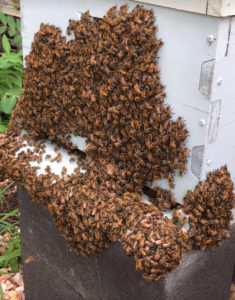 The Help the Honeybees class is $39 for a 90-minute workshop on March 12. The class is from 4:30-6 p.m.
The Help the Honeybees class is $39 for a 90-minute workshop on March 12. The class is from 4:30-6 p.m.
“There’s a lot of misinformation around honeybees, like when people say ‘my kid was playing baseball and got stung by one,'” Garmon said. “So we look at honey bees vs. wasps and yellowjackets. That way when kids are walking around their yard and see a honey bee on a flower, they’ll know it’s not an aggressive insect. It gets them to go back out to their kids and their parents and teach them what they learn.”
Beyond just an elementary apiary education, Garmon said there’s life lessons for kids to learn from the hive. One honey bee only makes one-twelfth of a teaspoon of honey, and Garmon said there are a lot of kids can learn about the power of collaboration through that.
“There’s a lot of biomimicry,” Garmon said. “These insects only live a couple weeks, but what they live their entire life doing is serving to benefit their community. You can parallel that to these kids, who may feel small and insignificant. They get little straws and run around ‘pollinating flowers.’ Bring some of that nectar back to the hive. Even though these are small droplets of water, the end result is much bigger than themselves.”
Garmon said he hosted an initial class when the Youth Enrichment Program started in the fall and it filled up quickly. There’s only a few slots open left in the March session, but Garmon said he hopes to host another one in May.
Other classes being offered over the next few months include an animation class and a guide to making fascinators. Matos said he’s particularly excited about the math strengthening classes, but those are currently full. This summer, Matos said the Youth Enrichment Program plans to offer STEM-related classes like “Programming through Minecraft” and “Building Fortnite Games.”
Photos courtesy Brad Garmon


